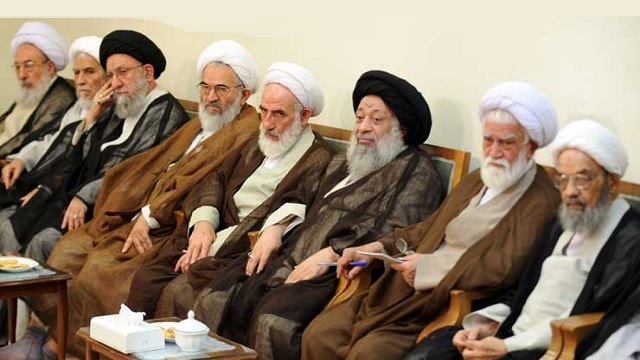Remembering the Infighting Among Iran’s Mullahs
By Amil Imani

First published in 2007
Looking past the narrow prism of the mainstream media, one is struck by a seemingly severe anomaly in the Islamic Republic of Iran. The Mullahs presently ruling the country are fighting for their life on two fronts. The external battle is with the United States—the Great Satan and its adopted child Israel, or the Zionist Entity, as the Mullahs call it. The other front we don’t hear much about is the Mullahs’ infighting, which presents an even more significant threat for de-frocking the in-power cleric conmen.
- Iran’s Supreme Leader called on the country’s ruling elite on July 4 to stop infighting, which he called a propaganda gift to the Islamic Republic’s foreign enemies.
- Ayatollah Ali Khamenei’s comments aimed to ease mounting criticism of President Mahmoud Ahmadinejad, who faces a possible summons to answer questions from a hostile conservative-dominated parliament, some of whose members have discussed impeaching him.
- “We should try to reduce differences in opinions as much as possible,” the 71-year-old cleric told a gathering of senior officers of the Revolutionary Guards in a televised address.
- In March, Khamenei said Iran would make the coming year one of “economic jihad.”
- Reuters story: Iranian leader says infighting is a gift to enemies
Why are the Mullahs of Iran battling each other instead of fighting the Great Satan? It is the nature of the beast. As with all other Islamic offshoots, the Shiite sect of Islam is a conglomerate of many feuding factions. Even before the last spade of dirt covered Muhammad’s grave, jockeying for power began earnestly among his chief disciples. Muhammad’s son-in-law’s cousin Ali felt he should take over the family business as the boss’s kin. Other more powerful and cunning contenders elbowed Ali out of the way, and Ali got to run the business after three others in succession held the office. Ali’s turn was concise since some of the believers who had been angry at him for allowing himself to be kicked around by the ones who preceded him—the usurpers of the mantle of Islam, as they saw it—daggered the man to death. At the same time, he was on his way to pray at a mosque.
So, the rest is history. Feuding, infighting, and bloodletting are the standard operating procedure in the religion of peace that aims to do whatever it can to snare the world into its fold.
Historical precedence aside, the present Shiite Iran is home to over 300,000 Mullahs. The most descriptive term for Mullah is a parasite. A Mullah begins his career as a parasite, lives as a parasite, and dies as a parasite, simply because he contributes absolutely nothing to the necessities of life yet gobbles disproportionately more of whatever resources he can devour.
As a true parasite, a Mullah’s very survival depends on others. A Mullah must procure and maintain docile, obedient hosts. A flock of gullible, ignorant fanatics makes excellent hosts, and the Mullahs’ main task is to keep the sheep in their pen by hook or crook. They scare the flock with horror stories of hell and entice them with the promise of unimaginable glorious paradise if they behave and keep supplying them with milk, wool, and meat.
So, the infighting is all about survival. One bunch is having it all while another is sidelined. We must understand that there has never been one united house of the Mullahs. Mullahs are like packs of wolves. Each pack hunts and eats its prey. Packs of wolves fight one another for valued game, particularly in the face of scarcity.
The coffer of the Islamic Republic of Iran is flush with extortion-high oil revenues. A reasonable question is: why don’t the Mullahs share the wealth and attend to the business of fighting the external enemy? When it comes to money, enough is never enough. “There is enough to meet everyone’s need, but not enough to meet everyone’s greed,” observed Gandhi. And greed is in the very bones of the Mullahs since it is the only way parasites know how to live.
The present Mullahcracy is in the form of a pyramid. The Mullahs in the game at the top have skimmed and continue to skim inordinate amounts of the national income. Mullah Akbar Rafsanjani, a past president of the Islamic Republic, and his family, for instance, have reportedly stolen enough to give Wal-Mart’s Waltons a run for their money. And there are hundreds of lesser Mullahs, like the late Rafsanjani, who are pocketing huge sums.
The ruling Mullahs—the in-boys—are master practitioners of trickle-down economics, except that by the time they are through with pocketing some of the national income and paying off their supporters, there is little left for the out-boys—the sidelined Mullahs.
The in-boy Mullahs must pay for the loyalty of the military, the police, and the thugs to keep them in power. Furthermore, in contrast to their mastery of machination, treachery, and cruelty, they are inept at managing the affairs of the state.
The Islamic Republic of Iran is a unique creature—it is best described as Theocratic Aristocracy. The “divinely ordained” rulers maintained power through an elaborate patronage system. Lucrative positions, contracts, and valued privileges are distributed by patronage. The result is that the ruling Mullahs enjoy a significant number of supporters in all strata of society—the civil service, the military, the powerful Revolutionary Guards, and the hooligans and thugs who are ready to unleash their vicious attacks on anyone or group that dares to challenge the in-charge men of Allah.
Another seeming anomaly is that many Mullahs are also in the Islamic Republic prisons. The reason is that these are the out-boy Mullahs—the parasites that are deprived of the dole—their very means of livelihood. Their mosques are often shut down, the system’s agents harass their flocks, and their sources of income are dried. And, as we said, it is the nature of the beast, for parasites can only live from the products of others.
The out-boy Mullahs hate the in-boy Mullahs, not only for looting Iran’s oil money but also for badly impoverishing the masses who had traditionally fed and pampered them. The per capita income in present Iran is about two-thirds of what it was before the catastrophic Islamic takeover of 1979. The flock of ignorant fanatic fools, the Mullahs’ traditional source of sustenance, can barely feed itself and has very little to spare for the leeching Mullahs.
Another point that needs clarification is the myth widely circulated by the mainstream media and the ivory tower pundits: the claim that there is a significant division among Shiites regarding the relationship between the mosque and the state. Let this myth be dispelled once and for all.
There is no such division among the Shiites. The perceived difference is, in fact, a strategic one. One camp, led by the late ayatollah Khomeini, believes it is admissible for the Mullahs to rule the state directly, as is the case in present Iran. The other camp believes that the Mullahs should only supervise the civilian government. In other words, one group wants to be the king, while the other wants to be the kingmaker. The difference is academic. The latter camp led by the grand ayatollah Al-Sistani of Iraq can have its cake and eat it, too, so to speak. It can have all the say and power it desires by proxy and simultaneously absolve itself of any responsibility for governmental wrongdoing or failure.
In conclusion, Iran’s deep-seated problem lies in Islam itself and its beneficiaries, the parasitic mullahs, the Basij, and the Revolutionary Guard leeches. There is nothing new in Iran under the Imamate rule or “Velayat-e faqih,” (Islamic jurisprudence). Feuding, infighting, raping, torturing, stoning, and killing are longstanding practices of the religion of peace. If and when the non-Islamic world solves its myriad problems ranging from dealing with a pompous lunatic playboy (Kim Jong-Il) with nuclear weapons to that endemic hunger, disease, and environmental degradation, it can embrace Islam to avoid the boredom of peace. “Peace is boring, war is exciting,” is an old saying. And Islam has never been boring.
©2023. Amil Imani. All rights reserved.

This article is courtesy of DrRichSwier.com, an online community of citizen journalists, academics, subject matter experts, and activists to express the principles of limited government and personal liberty to the public, to policy makers, and to political activists. Please visit DrRichSwier.com for more great content.

